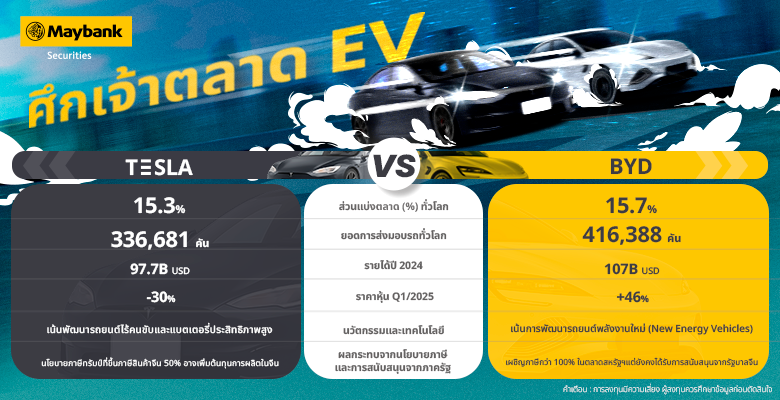🔥Watt Wars: The Battle of EV Giants
The competition in the electric vehicle (EV) market is heating up every year, especially between two giants: Tesla from the U.S. and BYD from China, both now top players on the global stage. With clearly different strategies and fluctuating quarterly results, the battle is only getting more intense.
Q1/2025 Comparison: BYD Surpasses Tesla in Multiple Dimensions
-Global Sales: BYD delivered 416,388 units, while Tesla sold 336,681 units.
-Market Share: BYD holds 15.7%, with Tesla trailing at 15.3%.
-2024 Revenue: BYD brought in $107 billion, while Tesla’s revenue was $97.7 billion.
-Stock Price Q1/2025: Tesla saw a -30% drop, while BYD soared +46%.
Though Tesla remains the more recognized brand globally, in terms of "business results", BYD currently holds the upper hand in several key areas.
⚙️ Different Strategies: Cutting-Edge Tech vs. Solid Back-End Operations
Tesla focuses on continuous in-house technological development, especially in battery tech, autonomous driving, and vertical integration. However, in 2025, the company faces several challenges, such as declining deliveries, a drop in stock prices, and criticism surrounding Elon Musk’s political involvement, which is affecting the brand’s image.
On the other hand, BYD benefits from full control over its supply chain in China, producing over 70% of its parts in-house. This strategy helps reduce production costs and increase gross margins. Additionally, BYD enjoys strong support from the Chinese government, both financially and through favorable tax policies.
📉 Challenges Pressing Tesla Further
One of the biggest challenges is the significant drop in deliveries. In Q1 2025, Tesla delivered just 386,810 vehicles, which fell short of the 450,000 units analysts had predicted, and was an 8.5% decrease compared to the same quarter last year. This marks the first year-over-year contraction since 2020, during the COVID-19 pandemic.
Another major issue is delays in launching new products, particularly the $25,000 budget-friendly vehicle that was originally slated for release in late 2025. Elon Musk has confirmed a delay of at least a year, with the company now focusing on developing the autonomous Robotaxi instead. This has led many investors to question the company’s strategy and its ability to stay competitive, especially as rivals like BYD, Xiaomi, and even Japanese brands push further into the affordable EV market.
Tesla's stock price has been consistently impacted, dropping more than 30% since the beginning of the year. This decline is driven by market concerns over its slowing growth, along with issues surrounding Elon Musk—both his personal behavior and his increasing focus on projects outside of Tesla, such as X (formerly Twitter) and SpaceX. There’s growing concern that Musk might not be able to "split his time" effectively, especially as Tesla faces mounting challenges.
Additionally, Tesla is dealing with the ongoing trade tensions between the U.S. and China, which have disrupted multiple points in its supply chain, particularly in the areas of batteries and key components still reliant on Chinese production. While Tesla has been expanding production to Mexico, Germany, and India, it will take time to stabilize operations and adjust to the local regulations in each region.
When you factor in slowing sales, delays in new product launches, leadership concerns, and the broader economic and political climate, Tesla finds itself at a critical juncture where it must "prove itself" once again in the increasingly competitive EV market.
E-mail Customer Service
mst.clientservice@maybank.comCall Customer Service
026585050Line Customer Service
@maybankfriends